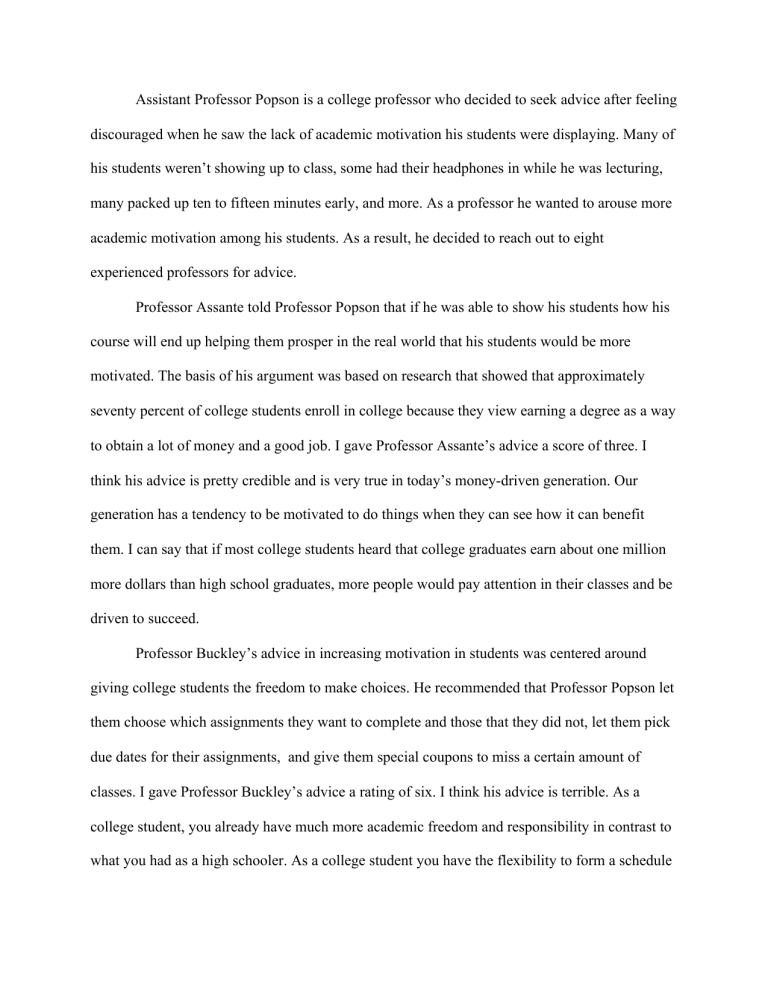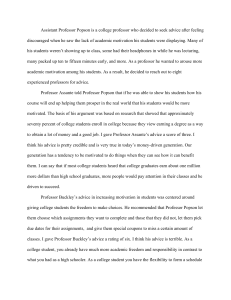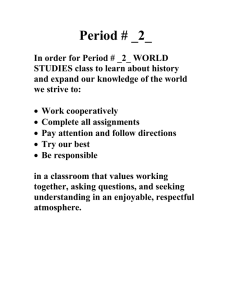Uploaded by
Katrianna Morrissey
Motivating College Students: Professor Advice & Personal Reflection
advertisement

Assistant Professor Popson is a college professor who decided to seek advice after feeling discouraged when he saw the lack of academic motivation his students were displaying. Many of his students weren’t showing up to class, some had their headphones in while he was lecturing, many packed up ten to fifteen minutes early, and more. As a professor he wanted to arouse more academic motivation among his students. As a result, he decided to reach out to eight experienced professors for advice. Professor Assante told Professor Popson that if he was able to show his students how his course will end up helping them prosper in the real world that his students would be more motivated. The basis of his argument was based on research that showed that approximately seventy percent of college students enroll in college because they view earning a degree as a way to obtain a lot of money and a good job. I gave Professor Assante’s advice a score of three. I think his advice is pretty credible and is very true in today’s money-driven generation. Our generation has a tendency to be motivated to do things when they can see how it can benefit them. I can say that if most college students heard that college graduates earn about one million more dollars than high school graduates, more people would pay attention in their classes and be driven to succeed. Professor Buckley’s advice in increasing motivation in students was centered around giving college students the freedom to make choices. He recommended that Professor Popson let them choose which assignments they want to complete and those that they did not, let them pick due dates for their assignments, and give them special coupons to miss a certain amount of classes. I gave Professor Buckley’s advice a rating of six. I think his advice is terrible. As a college student, you already have much more academic freedom and responsibility in contrast to what you had as a high schooler. As a college student you have the flexibility to form a schedule that best fits your priorities, in addition to the fact that you get to pick classes that will help you advance in your major. Giving students more leeway and so called ‘academic freedom’ would end up making the students feed a feeling of entitlement later on that they will carry for the rest of their lives. As a result, they will be met with a rude awakening in the business world if they try to bring that same attitude to the workplace. Professor Chang’s advice was centered around the idea that deep down everyone wants to make a difference. He supported this argument based on a survey he read that showed most first year students believed it was important to help others. Although his advice sounds good on a moral level, I don’t believe this advice would help Professor Popson motivate his students. Consequently, I gave Professor Chang’s advice a score of five. Our upcoming generation has the tendency to be very self centered and selfish, so although they might think it’s very important to help others and make a difference, very few people actually live it out. You can see this firsthand on social media. Some people will post all about having respect for women and the standards you should treat them with, but simultaneously stand by and video tape as they watch a guy beat up his girlfriend. However, I do think that every once in a while it would be beneficial for Professor Popson to ask his students how they want to make a contribution to the world by fulfilling their dreams as a means to consistently cultivate existing motivation. Professor Donnelly’s advice for increasing academic motivation was to center the focus on grades. He recommended everything from having a quiz at the beginning of class, to taking points off assignments if students were absent, or giving extra credit for work turned in early. Although, I don’t think you should put emphasis on getting good grades over actually learning and retaining information, I can say that for many grades are a huge motivator. As a result, I gave Professor Donnely’s advice a rating of four. Personally, I know many people who have a tendency to be motivated by grades, me included. Although this method tends to be very effective, it alters the students goal on achieving good letter grades instead of actually coming in with the goal to learn something new. This proceeds to cultivate a reward system that one begins to form in their brain. Additionally, there will always be those students who don’t care about their grades. For example, if Professor Popson were to give a quiz at the beginning of every class, some students would just end up skipping the start of class. This would actually end up discouraging many students and making them dread the class even more, instead of rallying additional motivation. Professor Egret’s advice to increase motivation was to make the students feel part of a community. He encouraged Professor Popson to increase group work and assign more interesting discussions that involved the class in whole. Professor claimed that when “students start feeling like they belong and start caring about one another, you’ll see their academic motivation go all the way up.” I gave Professor Egret’s advice a rating of six. I didn’t really agree with his advice because I've found that many times in group work, many people end up talking about unrelated topics instead of the assignment. Additionally, most of the time the group project falls on the shoulders of a few willing people that want to get a good grade, which then causes them to complete the brunt of the assignment. Professor Fanning’s advice was to build the expectation of being successful to increase motivation. He told Professor Popson that he should give easier assignments to build the student’s confidence and slowly build up the difficulty until they feel like they can do the activities successfully. I gave Professor Fanning’s advice a rating of seven. I don’t think that Professor Popson should try this with college students, because after all they are supposed to be performing at a college level. Teachers in elementary school and middle school use the building up strategy to help make their students more successful, but I don’t think that’s a wise strategy to incorporate into a college class. Additionally, I think it could lead to false expectations on the college students' part because they might be able to do the first couple of assignments and at the same time build their confidence. However, once they start receiving more difficult assignments they might struggle to pass, and their renewed self confidence will probably regress again. I think it would be a better idea to set the standard beforehand, so that students will be encouraged to grow in hopes of being able to either meet the standard or surpass it. Professor Gonzalez recommended making learning more engaging and enjoyable to increase motivation. He suggested making fun powerpoints, inviting guest speakers, encouraging group discussions and more. I gave Professor Gonzales’s advice a score of four. I think that making the learning material more engaging can increase student motivation, however I think that it will only go so far. Some students, no matter what you do, just don’t have a desire to learn and will therefore be just as unwilling to learn whether the material is exciting or not. On the contrary, making learning material more engaging can result in students being excited to go to class and learn. Personally, I’ve had teachers who have made class so engaging and enjoyable that I couldn’t wait for my next class with them, so I think Professor Gonzales' advice is true to some extent. Professor Harvey told Professor Popson that you can’t motivate people who don’t want to be motivated. He then continued to say that trying to motivate students who don’t care to learn is a waste of energy and time. I gave Professor Harvey’s advice a score of five. I think that his advice was right on point. Although it will not improve Professor Popson feelings of discouragement, it will prevent him from wasting extra time and effort on students who won’t replicate it. I've seen this firsthand in school settings. I’ve had people at my old schools that teachers worked their butt’s of in hopes of seeing them begin to succeed, only to be disappointed when they realized they could not force them to change. It reminds me of the saying “You can bring a donkey to water, but you can’t make it drink.” When a student is ready to learn they will start performing, otherwise no amount of extra time and energy will motivate them to learn. I don’t think there is an approach that was not mentioned by one of the eight professors that would be more motivating for me. The two things that motivate me to succeed are good grades and material that is taught in a way that is exciting and enjoyable. I find that when I’m motivated by these two things, I have a tendency to do really well in specific subject areas. For example, Personal Finance is not the most enjoyable topic in the world, but I find myself not dreading the class because my teacher makes it more exciting and enjoyable. In addition, my teacher makes an effort to cultivate group discussions and activities to keep us all engaged. Paired with my motivation to get a good grade has resulted in my being more motivated for success in that class. From doing this exercise, it really made me understand how hard a teacher’s job truly is. Teachers have to deal with disrespectful kids, unique personality traits, different levels of motivation among individuals, and still be expected to make each of their students succeed. By doing this activity, I was able to realize the importance of trying to make your instructor feel encouraged and giving them your utmost attention. Also, this activity helped me understand the different ways teachers try to cater to their students in order to increase motivation. It has really made me appreciate all the extra effort that most teachers put into their students in hopes of promoting academic success and motivation.


